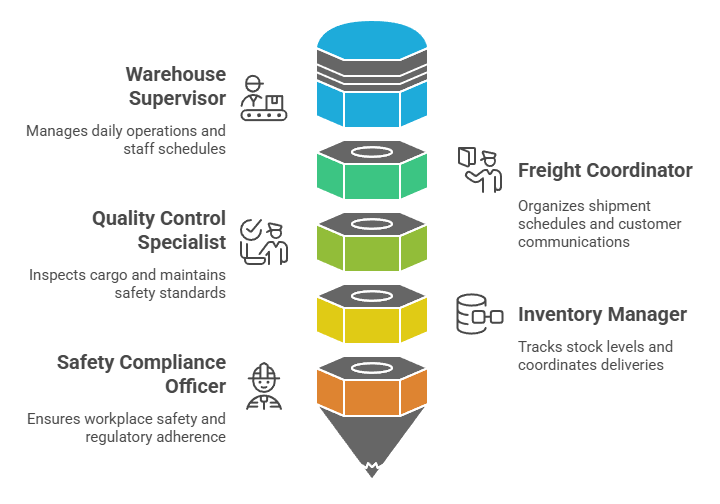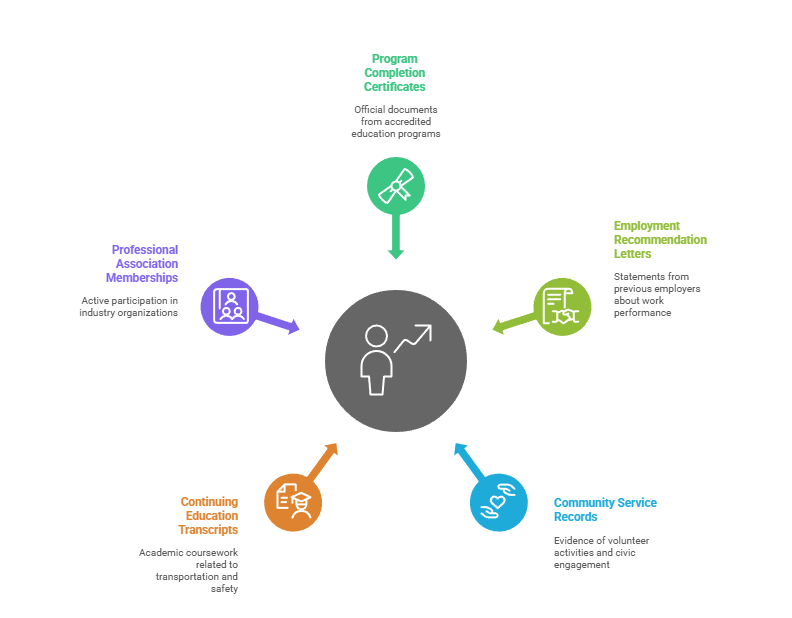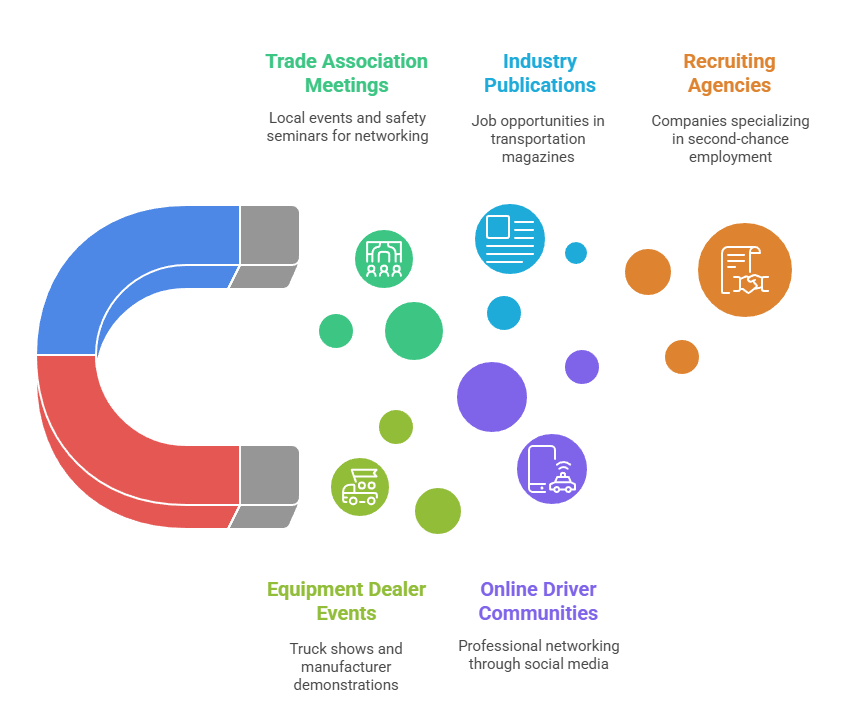Commercial drivers with DUI convictions face significant employment challenges but still have viable career paths within the transportation industry. Understanding DOT regulations, timing restrictions, and employer-specific policies enables drivers to make informed decisions about their professional futures.
Key Takeaways
- CDL DUI disqualification periods vary from one to ten years depending on the severity and number of offenses, with lifetime bans for repeat serious violations.
- Intrastate driving opportunities may be available in some states for drivers disqualified from interstate commerce, offering limited but viable employment options.
- Background check timing is crucial, as employers typically review driving records from the past 3-10 years when making hiring decisions.
- Rehabilitation programs and safety courses can demonstrate commitment to change and may influence employer decisions positively.
- Transportation industry alternatives include warehouse operations, logistics coordination, and equipment maintenance roles that don't require active CDL use.
- Legal consultation is recommended to understand specific state regulations and explore options for record expungement or license reinstatement.
Understanding CDL and DUI Impact on Commercial Driving
A Commercial Driver's License (CDL) allows individuals to operate large trucks, buses, and other commercial vehicles weighing over 26,000 pounds. Additionally, CDL holders can transport hazardous materials or carry 16 or more passengers. The Federal Motor Carrier Safety Administration (FMCSA) maintains strict standards for CDL holders due to public safety concerns. When a commercial driver receives a DUI conviction, it triggers automatic disqualification periods that can severely impact employment prospects.
The transportation industry operates under zero-tolerance policies regarding alcohol and drug violations. A single DUI conviction results in a one-year CDL disqualification for first-time offenders. Meanwhile, a second conviction leads to lifetime disqualification from commercial driving. These penalties apply regardless of whether the DUI occurred in a personal vehicle or commercial truck. Therefore, the consequences are far-reaching for professional drivers seeking to maintain their careers.
Commercial drivers must understand that federal regulations supersede state laws in these matters. Even if a state allows restricted driving privileges for personal vehicles, federal CDL disqualification remains in effect. This distinction is crucial for drivers who may assume state programs apply to their commercial licenses. Furthermore, employers cannot waive these federal requirements, regardless of driver experience or company needs.
DOT Regulations and Disqualification Periods
Federal DOT regulations establish mandatory disqualification periods that cannot be waived by individual states or employers. First-time DUI offenders face a one-year disqualification period during which they cannot operate any commercial motor vehicle. Drivers who refuse chemical testing receive identical penalties as those who fail the test. This emphasizes the strict nature of these regulations across all circumstances.
| Violation Type | First Offense | Second Offense |
| DUI/DWI in personal vehicle | 1 year disqualification | Lifetime disqualification |
| DUI/DWI in commercial vehicle | 1 year disqualification | Lifetime disqualification |
| Refusal to test | 1 year disqualification | Lifetime disqualification |
The severity increases dramatically for drivers operating commercial vehicles while impaired. A DUI conviction while driving a CMV results in enhanced penalties and potential criminal charges. Similarly, driving with a BAC of 0.04% or higher in a commercial vehicle triggers these same consequences.
2025 Regulatory Updates and Changes
Recent updates to FMCSA regulations have clarified several aspects of CDL DUI enforcement for 2025. The Drug and Alcohol Clearinghouse now requires more comprehensive reporting from employers and medical review officers. Additionally, new electronic monitoring systems track violations more efficiently across state lines.
State coordination with federal databases has improved significantly in 2025. Consequently, drivers can no longer avoid detection by moving to different states after violations. This enhanced tracking system ensures consistent enforcement of disqualification periods nationwide.
Employment Opportunities During Disqualification
Commercial drivers facing CDL disqualification can explore various employment alternatives within the transportation and logistics sectors. Many trucking companies offer non-driving positions that utilize industry knowledge and experience. These roles often provide pathways back into driving positions once disqualification periods end.
Transportation companies value experienced drivers in operational roles because they understand industry challenges and regulatory requirements. These positions often offer competitive salaries ranging from $35,000 to $65,000 annually. Furthermore, they provide opportunities for career advancement while maintaining connections within the industry.
The logistics sector has expanded significantly in 2025, creating new opportunities for displaced commercial drivers. E-commerce growth continues to drive demand for supply chain professionals. Therefore, drivers with industry experience find themselves well-positioned for these emerging roles.
Warehouse and Distribution Opportunities
Warehouse operations provide immediate employment opportunities for drivers during disqualification periods. These positions leverage existing knowledge of freight handling, safety protocols, and logistics operations. Most warehouse positions require minimal additional training for experienced commercial drivers.

- Warehouse supervisor roles: Managing daily operations and coordinating staff schedules
- Freight coordination positions: Organizing shipment schedules and customer communications
- Quality control specialist jobs: Inspecting cargo and maintaining safety standards
- Inventory management roles: Tracking stock levels and coordinating deliveries
- Safety compliance positions: Ensuring workplace safety and regulatory adherence
Many companies prefer hiring former drivers for these positions because they understand the practical challenges of freight operations. Additionally, these roles often lead to management opportunities within 2-3 years of employment.
Fleet Management and Support Roles
Fleet management companies actively seek experienced drivers for support positions that don't require active CDL use. These roles combine industry knowledge with administrative responsibilities. Moreover, they often pay competitively while providing opportunities for professional growth.
Fleet managers coordinate vehicle maintenance schedules, track driver hours, and ensure regulatory compliance. Dispatchers manage route planning, customer communications, and emergency response coordination. Equipment specialists handle vehicle inspections, maintenance scheduling, and regulatory compliance documentation. These positions typically offer starting salaries between $40,000 and $55,000 annually.
State-Specific Intrastate Driving Options
Some states allow drivers with federal CDL disqualifications to obtain intrastate-only commercial licenses for driving within state boundaries. These opportunities vary significantly by state, with some offering restricted licenses for specific industries. However, drivers must research their state's specific regulations and application processes thoroughly.
| State Program Type | Availability | Typical Requirements |
| Agricultural exemptions | 15 states | Seasonal work, farm operations |
| Construction permits | 22 states | Local projects, equipment operation |
| Emergency services | 8 states | Fire departments, emergency response |
Intrastate CDL opportunities typically involve local delivery routes, construction equipment operation, or agricultural vehicle driving. While these positions offer lower pay than long-haul trucking, they provide legitimate employment options during federal disqualification periods.
Application Process and Requirements
Applying for intrastate CDL privileges requires meeting state-specific criteria beyond federal regulations. Most states require completion of alcohol education programs and demonstration of financial responsibility. Additionally, waiting periods before applications are considered range from 30 to 180 days.
Required documentation often includes court records and completion certificates from rehabilitation programs. Some states also require employer recommendations and medical examinations. Furthermore, road tests may be necessary even for drivers with valid CDL experience.
Industry-Specific Exemptions
Agricultural operations in many states provide exemptions for certain types of commercial driving during federal disqualification periods. These exemptions typically apply to seasonal work within 150 miles of farm operations. Construction companies may also offer similar opportunities for local equipment operation. Emergency services occasionally provide exemptions for volunteer firefighters or emergency responders.
However, these exemptions come with strict limitations and monitoring requirements. Drivers must maintain detailed logs of their activities and locations. Additionally, any violation of exemption terms results in immediate revocation of privileges.
Background Check Considerations for CDL Employment
Transportation companies conduct thorough background checks that examine driving records, criminal history, and employment verification. Most employers review driving records for the past three to ten years. Therefore, the timing of job applications becomes crucial for drivers with DUI convictions.
The Pre-Employment Screening Program (PSP) allows employers to access five years of crash data and three years of inspection history. This system means that DUI convictions and related violations remain visible to employers for extended periods. Consequently, drivers must address these issues proactively during the hiring process.
Drivers should obtain copies of their own records before applying for positions. This allows them to address discrepancies or prepare explanations for potential employers. Additionally, honesty during the application process builds trust and demonstrates accountability for past mistakes.
Employer-Specific Policies and Exceptions
Individual trucking companies maintain policies beyond federal minimum requirements, creating variations in hiring practices across the industry. Large carriers often have stricter policies than smaller companies due to insurance requirements. Corporate risk management strategies also influence these decisions significantly.
Some companies impose longer waiting periods after DUI convictions, while others focus on demonstrated rehabilitation. Small trucking companies may offer more flexible hiring policies for qualified drivers. Owner-operators often provide the most lenient opportunities for drivers with past violations.
Insurance and Liability Considerations
Commercial vehicle insurance rates significantly impact employer hiring decisions for drivers with DUI histories. Insurance companies typically increase premiums by 25-75% for drivers with recent violations. Some insurers refuse coverage entirely for drivers with multiple violations. Therefore, employers must weigh increased costs against driver qualifications and experience.
Self-insured carriers sometimes offer more flexibility in hiring drivers with past violations. These companies assume direct liability rather than purchasing traditional insurance coverage. However, they often require extensive safety training and monitoring programs for high-risk drivers.
Rehabilitation and Professional Development
Completing alcohol education programs and defensive driving courses demonstrates commitment to safety and professional improvement. Many employers view these credentials favorably when evaluating candidates with past DUI convictions. Professional development activities can differentiate applicants and show genuine efforts toward rehabilitation.
Industry associations and community colleges offer relevant coursework that enhances employability during disqualification periods. These programs often cost less than $1,000 and provide valuable networking opportunities. Furthermore, they connect participants with industry professionals and potential employers.
The National Safety Council offers specialized programs for commercial drivers seeking rehabilitation credentials. Similarly, the American Trucking Associations provides professional development resources. These programs have gained recognition among employers as indicators of serious commitment to safety improvement.
Documentation and Record Keeping
Maintaining detailed records of rehabilitation efforts creates a comprehensive portfolio for potential employers. This documentation demonstrates accountability and proactive efforts to address past mistakes. Additionally, it shows commitment to building qualifications for future opportunities.

- Program completion certificates: Official documentation from accredited education programs
- Employment recommendation letters: Statements from previous employers about work performance
- Community service records: Evidence of volunteer activities and civic engagement
- Continuing education transcripts: Academic coursework related to transportation and safety
- Professional association memberships: Active participation in industry organizations
Organizing these materials professionally shows attention to detail and commitment to career advancement. Many drivers create digital portfolios that can be easily shared with potential employers during the application process.
Substance Abuse Treatment Programs
Completing certified substance abuse treatment programs carries significant weight with potential employers. These programs must meet specific standards established by the Department of Transportation. Additionally, they require ongoing monitoring and follow-up assessments to maintain certification.
Outpatient programs typically last 3-6 months and cost between $2,000 and $5,000. Intensive outpatient programs require 10-15 hours per week of counseling and education. Residential programs offer more comprehensive treatment but require extended time away from employment.
Alternative Career Paths in Transportation

The transportation industry offers numerous career paths that don't require active CDL use but benefit from commercial driving experience. Logistics coordination, freight brokerage, and transportation management provide opportunities to remain in the industry. Additionally, these roles allow drivers to build new skills and career prospects.
Technology companies serving the transportation industry also value experienced drivers for product development roles. Customer service positions combine industry expertise with technical skills. These unique opportunities exist in the evolving transportation sector throughout 2025.
Supply chain management has become increasingly important as companies focus on efficiency and cost reduction. Former drivers often excel in these roles because they understand practical challenges. Moreover, they can communicate effectively with current drivers and operational staff.
Freight Brokerage and Logistics
Freight brokerage offers excellent opportunities for former drivers to leverage their industry knowledge while building new careers. Brokers connect shippers with carriers and negotiate rates for transportation services. This role requires understanding both shipper needs and carrier capabilities.
Entry-level broker positions typically start at $35,000-$45,000 annually with commission opportunities. Experienced brokers can earn $75,000-$150,000 or more through successful client relationships. Many successful brokers eventually start their own companies after gaining experience and building client networks.
Driver Training and Education
Commercial driving schools actively seek experienced drivers as instructors once disqualification periods end. These positions require additional certification but offer stable employment with regular schedules. Furthermore, instructor positions provide opportunities to positively impact new driver safety and professionalism.
Training positions typically pay $40,000-$60,000 annually with benefits packages. Many schools offer flexible scheduling that accommodates family obligations. Additionally, instructors often receive continuing education opportunities to maintain current knowledge of industry regulations.
Transportation Sales and Customer Service
Transportation companies need sales representatives who understand customer challenges and industry capabilities. Former drivers excel in these roles because they can speak knowledgeably about service capabilities. Additionally, they understand the practical limitations and possibilities of transportation operations.
Customer service positions require strong communication skills and problem-solving abilities. These roles involve coordinating shipments, resolving delivery issues, and maintaining client relationships. Many transportation companies prefer hiring former drivers for these customer-facing positions.
Legal Resources and License Reinstatement
Consulting with attorneys specializing in CDL and DUI matters can reveal options for record expungement or alternative legal remedies. Some states offer restricted licenses or early reinstatement programs for drivers who complete specific requirements. Additionally, legal professionals can assist with understanding complex federal and state regulations.
The investment in legal consultation often pays for itself through faster reinstatement or access to employment opportunities. Many attorneys offer payment plans that make their services accessible to drivers facing financial hardship. Furthermore, some legal aid organizations provide reduced-cost services for qualified individuals.
Driver advocacy organizations have emerged in 2025 to help commercial drivers navigate legal challenges. These groups provide resources, referrals, and support throughout the reinstatement process. Additionally, they work to influence policy changes that affect driver employment opportunities.
Costs and Timeline Considerations
Legal assistance for CDL DUI matters typically costs $1,500-$5,000 depending on case complexity and required services. Simple record reviews and consultation may cost $500-$1,000. However, complex appeals or reinstatement proceedings can exceed $10,000 in total costs.
Timeline for legal processes varies widely from 60 days for simple record requests to over two years for complex appeals. Starting legal processes early in the disqualification period maximizes options and may reduce overall career impact. Additionally, early intervention sometimes prevents additional complications.
Record Expungement and Sealing Options
Some states allow expungement or sealing of DUI records after specific waiting periods and requirements are met. These processes can significantly improve employment prospects by limiting employer access to conviction records. However, federal CDL disqualification periods must still be served regardless of state record modifications.
Expungement typically requires completion of probation, payment of all fines, and demonstration of rehabilitation. The process can take 6-18 months and costs $2,000-$5,000 including legal fees. Success rates vary by state and individual circumstances.
Job Search Strategies and Interview Preparation
Successful job searches after CDL DUI convictions require targeted strategies that address employer concerns while highlighting qualifications. Focusing on smaller companies, specialized industries, and personal networking often produces better results. Additionally, these approaches avoid the strict policies of large carriers.
Preparing honest, concise explanations of past violations helps during interviews and demonstrates accountability. Practice discussing the situation professionally while emphasizing lessons learned. Furthermore, highlight steps taken to prevent future issues and commitment to safety improvement.
The job market for commercial drivers remains strong in 2025 despite economic uncertainties. E-commerce growth continues to drive demand for transportation services. Therefore, qualified drivers with clean records since their violations find opportunities available.
Effective Job Search Tactics
Industry networking events provide opportunities to meet employers and build professional relationships. Direct company contact often works better than online applications for smaller carriers. Additionally, referral programs leverage existing industry contacts for introductions.

- Trade association meetings: Local trucking association events and safety seminars
- Equipment dealer events: Truck shows and manufacturer demonstrations
- Industry publications: Job opportunities in specialized transportation magazines
- Online driver communities: Professional networking through social media platforms
- Recruiting agencies: Companies specializing in second-chance employment opportunities
Timing job searches strategically around the end of disqualification periods allows for immediate employment when licenses are reinstated. Building relationships during disqualification periods can lead to job offers that begin immediately upon eligibility.
Interview Preparation and Presentation
Professional appearance and preparation demonstrate respect for the opportunity and commitment to the industry. Research potential employers thoroughly to understand their operations and requirements. Additionally, prepare specific examples of safe driving practices and professional achievements.
Address the DUI conviction directly when asked, taking full responsibility without making excuses. Explain what you learned from the experience and steps taken to prevent recurrence. Furthermore, emphasize your commitment to safety and professional standards moving forward.
Salary Negotiation and Employment Terms
Drivers returning from disqualification may need to accept lower initial wages while rebuilding their safety records. However, performance-based increases often become available within 6-12 months of employment. Additionally, many companies offer signing bonuses to attract qualified drivers.
Benefits packages may be limited initially but typically improve with tenure and performance. Health insurance, retirement plans, and paid time off often become available after probationary periods. Furthermore, many companies provide opportunities for advancement to training or supervisory roles.
Building Long-term Career Success
Rebuilding a commercial driving career after DUI conviction requires patience, dedication, and strategic planning. Focus on building an excellent safety record immediately upon license reinstatement. Additionally, maintain high professional standards in all aspects of employment.
Continuing education demonstrates commitment to professional growth and industry knowledge. Stay current with regulatory changes and new technologies affecting the transportation industry. Furthermore, maintain active participation in professional associations and networking activities.
Consider pursuing specialized endorsements or certifications that increase employment value. Hazmat, passenger, and school bus endorsements provide additional opportunities. Additionally, specialized training in areas like oversized loads or tanker operations can differentiate qualified drivers.
Technology and Industry Evolution
The transportation industry continues evolving with new technologies and regulations in 2025. Electronic logging devices, automated safety systems, and telematics require ongoing education. Additionally, understanding these systems demonstrates adaptability and professional commitment to employers.
Autonomous vehicle technology continues developing but hasn't eliminated the need for professional drivers. Instead, driver roles are evolving to include more technology monitoring and customer service responsibilities. Therefore, adapting to these changes positions drivers for long-term success.
Professional Network Development
Building strong professional relationships within the transportation industry provides long-term career security. Maintain contact with former colleagues, supervisors, and industry contacts. Additionally, participate actively in professional associations and continuing education opportunities.
Mentoring new drivers or participating in safety committees demonstrates leadership and community involvement. These activities enhance professional reputation and may lead to advancement opportunities. Furthermore, they provide personal satisfaction through contributing to industry improvement.
Conclusion
CDL DUI employment opportunities exist despite significant regulatory challenges, requiring strategic planning and professional development during disqualification periods. Understanding federal and state regulations helps drivers make informed decisions about career paths and timing for job searches. Rehabilitation programs, alternative transportation industry roles, and legal consultation provide pathways to rebuild professional careers. Success depends on honest communication with employers, demonstrated commitment to safety, persistent effort in building new industry relationships, and maintaining current knowledge of evolving industry requirements and opportunities.
Frequently Asked Questions
How long does a DUI affect CDL employment opportunities?
A DUI affects CDL employment for a minimum of one year for first-time offenders, with lifetime federal disqualification for second offenses. However, the conviction remains visible on driving records for 3-10 years depending on employer background check policies. This means potential impact on hiring decisions extends beyond the formal disqualification period. Many employers implement company policies that exceed federal minimum requirements.
Can I work for a trucking company during my CDL disqualification?
Yes, many trucking companies offer non-driving positions such as warehouse operations, dispatch coordination, and equipment maintenance. These roles often provide competitive salaries ranging from $35,000 to $65,000 annually. Additionally, they offer opportunities to maintain industry connections while serving the disqualification period. Many companies prefer hiring experienced drivers for these positions because they understand operational challenges.
Are there any states that allow CDL driving with a DUI conviction?
Some states offer intrastate-only commercial driving privileges that allow operation within state boundaries during federal disqualification periods. These programs vary significantly by state and typically require completion of rehabilitation programs. Additionally, waiting periods and additional testing are usually required before approval. Agricultural and construction exemptions are available in some states for specific types of work.
Will completing alcohol education programs help with CDL employment?
Yes, completing certified alcohol education programs, defensive driving courses, and safety training demonstrates commitment to rehabilitation and professional development. Employers often view these credentials favorably when evaluating candidates with past DUI convictions. Additionally, these programs can improve hiring prospects and may reduce insurance costs for employers. Documentation of program completion should be maintained for employment applications.
How do employers conduct background checks for CDL positions?
Employers use the Pre-Employment Screening Program (PSP) to access five years of crash data and three years of inspection history. They also review motor vehicle records for 3-10 years and conduct criminal background checks. Additionally, employment history verification focuses on experience gaps and performance records. The Drug and Alcohol Clearinghouse provides additional information about violations and return-to-duty processes.
Can I appeal my CDL disqualification or get early reinstatement?
Federal CDL disqualifications cannot be appealed or shortened under current regulations. However, some states offer programs for early license reinstatement or restricted driving privileges for personal vehicles. Additionally, consulting with an attorney specializing in CDL matters can help identify available options. Legal professionals can navigate complex federal and state regulations to determine the best course of action for individual circumstances.
Additional Resources
- Federal Motor Carrier Safety Administration CDL Requirements
https://www.fmcsa.dot.gov/registration/commercial-drivers-license - Pre-Employment Screening Program (PSP) Information
https://www.fmcsa.dot.gov/safety/research-and-analysis/pre-employment-screening-program-psp - National Association of Small Trucking Companies Job Resources
https://www.nastc.com/careers-opportunities - Commercial Driver's License Information System (CDLIS)
https://www.aamva.org/CDLIS-State-Contacts - DOT Drug and Alcohol Testing Regulations
https://www.transportation.gov/odapc/part40 - American Trucking Associations Career Center
https://www.trucking.org/careers - Drug and Alcohol Clearinghouse Information
https://clearinghouse.fmcsa.dot.gov - National Safety Council Defensive Driving Courses
https://www.nsc.org/safety-training/defensive-driving

GCheck Editorial Team
Meet the GCheck Editorial Team, your trusted source for insightful and up-to-date information in the world of employment background checks. Committed to delivering the latest trends, best practices, and industry insights, our team is dedicated to keeping you informed.
With a passion for ensuring accuracy, compliance, and efficiency in background screening, we are your go-to experts in the field. Stay tuned for our comprehensive articles, guides, and analysis, designed to empower businesses and individuals with the knowledge they need to make informed decisions.
At GCheck, we're here to guide you through the complexities of background checks, every step of the way.





